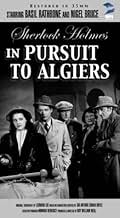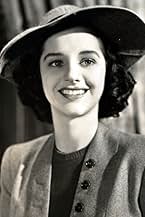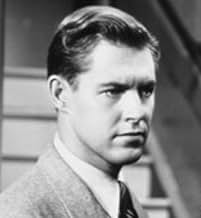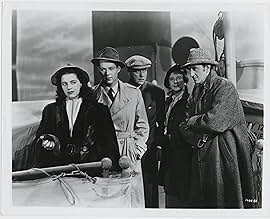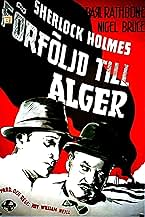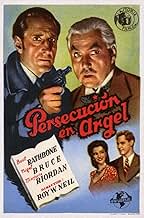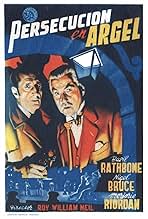PUNTUACIÓN EN IMDb
6,7/10
4,4 mil
TU PUNTUACIÓN
Añade un argumento en tu idiomaHolmes is recruited to escort the heir to a European throne safely back to his homeland after his father's assassination.Holmes is recruited to escort the heir to a European throne safely back to his homeland after his father's assassination.Holmes is recruited to escort the heir to a European throne safely back to his homeland after his father's assassination.
- Dirección
- Guión
- Reparto principal
William 'Wee Willie' Davis
- Gubec
- (as Wee Willie Davis)
Frederick Worlock
- Prime Minister
- (as Frederic Worlock)
Wilson Benge
- Clergyman
- (sin acreditar)
Sven Hugo Borg
- Johansson
- (sin acreditar)
Ernst Brengt
- Ship Passenger
- (sin acreditar)
James Carlisle
- Aide
- (sin acreditar)
Ashley Cowan
- Steward
- (sin acreditar)
James Craven
- Anton Petzval
- (sin acreditar)
Reseñas destacadas
The Sherlock Holmes Series is actually fun for the fans of Basil Rathbone and Nigel Bruce, but the individual films are a mixed bag as mysteries themselves. The best mysteries are THE SCARLET CLAW, THE HOUSE OF FEAR, THE ADVENTURES OF SHERLOCK HOLMES, THE HOUND OF THE BASKERVILLES, SHERLOCK HOLMES FACES DEATH. The ones about the war are mediocre - more like curiosities dealing with patriotism and the war effort. After the war the series resumed plots dealing with regular crime. The best of these was THE PEARL OF DEATH, but it was not up to the top five films. One of the final films was this one, PURSUIT TO ALGIERS.
Although all the other films were rewritten from the original Conan Doyle stories, PURSUIT TO ALGIERS was totally made up from a comment dropped in the original "Canon". Doyle wrote four novels and fifty six short stories about Holmes. But in this material (equal in size to say LES MISERABLES or DON QUIXOTE) were many little comments and statements that actually have helped lead to the myriad of essays and books by Holmes' fans. Among other things are the large number of cases of Holmes that he or Watson mention casually, but never write of. In this film, the untold story is "the affair of the steamship "Friesland" that so nearly cost us both our lives". It is mentioned in one of the stories of the series called THE RETURN OF SHERLOCK HOLMES, and is usually said to be set in 1895. The actions of PURSUIT TO ALGIERS take place on the steamship "Friesland", and do almost cost Holmes and Watson their lives, but this film is set after the end of World War II. Since there was no real short story that is nothing to be critical about.
Holmes is not in part of the film (and at one point it seems he has been killed), but he does appear about the middle, and he is in good form when he is. Witness the way he takes care of Martin Kosleck, and the way he makes a typically ironic comment to Kosleck as to why he was able to be prepared. Also the business about party favors is quite nicely done. So are the supporting parts - especially Bruce's comments regarding Rosalind Ivan and John Abbott and his partner. As an entertainment it is a fine film. As a mystery it really never gets very involving. We never understand who is in the background backing the anti-royal assassins. Presumably the Communists (this is 1945), but such a guess is based on the number of Eastern European monarchies that fell following the end of World War II. Still it would help to know who the super-villain is. But then Hitchcock always ignored the central rationales of his "MacGuffins". Why not on this lesser level then? So forget the pleasure of realism, sit back, and just enjoy the antics of the characters. And keep in mind, Basil and Nigel made only two other of these films afterward. It was nearly the end of the series for them and their fans.
Although all the other films were rewritten from the original Conan Doyle stories, PURSUIT TO ALGIERS was totally made up from a comment dropped in the original "Canon". Doyle wrote four novels and fifty six short stories about Holmes. But in this material (equal in size to say LES MISERABLES or DON QUIXOTE) were many little comments and statements that actually have helped lead to the myriad of essays and books by Holmes' fans. Among other things are the large number of cases of Holmes that he or Watson mention casually, but never write of. In this film, the untold story is "the affair of the steamship "Friesland" that so nearly cost us both our lives". It is mentioned in one of the stories of the series called THE RETURN OF SHERLOCK HOLMES, and is usually said to be set in 1895. The actions of PURSUIT TO ALGIERS take place on the steamship "Friesland", and do almost cost Holmes and Watson their lives, but this film is set after the end of World War II. Since there was no real short story that is nothing to be critical about.
Holmes is not in part of the film (and at one point it seems he has been killed), but he does appear about the middle, and he is in good form when he is. Witness the way he takes care of Martin Kosleck, and the way he makes a typically ironic comment to Kosleck as to why he was able to be prepared. Also the business about party favors is quite nicely done. So are the supporting parts - especially Bruce's comments regarding Rosalind Ivan and John Abbott and his partner. As an entertainment it is a fine film. As a mystery it really never gets very involving. We never understand who is in the background backing the anti-royal assassins. Presumably the Communists (this is 1945), but such a guess is based on the number of Eastern European monarchies that fell following the end of World War II. Still it would help to know who the super-villain is. But then Hitchcock always ignored the central rationales of his "MacGuffins". Why not on this lesser level then? So forget the pleasure of realism, sit back, and just enjoy the antics of the characters. And keep in mind, Basil and Nigel made only two other of these films afterward. It was nearly the end of the series for them and their fans.
Since the wartime production (1945) of the Sherlock Holmes' adventure, "Pursuit to Algiers", many films have been made involving a seagoing setting. Mysteries set aboard a ship I suggest are notoriously easy to begin and difficult to consummate; this is because it is easy to introduce characters in a claustrophobic setting but notoriously more difficult to arrange for a series of logical events perpetrated by them that is varied, believable and possessed of a wide-enough scope of action. I find "Pursuit to Algiers" to be an unusually believable decently-filmed low-budget ship-based adventure and a tidy storyline without any need for apologies. The writers began the piece on land, in fact using a low-grade but intriguing series of clues--recognized by detective Sherlock Holmes as such--to lure him to an expositional meeting. At that meeting, the Prime Minister of a fictitious Balkan country, one whose king has been murdered (though this fact has not been made public), hires the famous consulting detective to safeguard the nation's young prince as he heads home from his school in England to his homeland for a now-vital coronation ceremony. Holmes accepts the commission; then he heads off in an airplane, planning to meet his friend Dr. Watson later, for several reasons. Watson has cause to believe he has been killed; but he eventually does meet his partner aboard the ship they had planned to sail on, after several neat plot twists and a display of unusual intelligence by Holmes; and from then on, the two are kept exceptionally busy trying to assess who the potential murderers are (who will be their deadly opponents). They are given a fairly large cast of suspects to choose from. Holmes then neatly thwarts the villains at every turn, until near the end he is knocked unconscious and the prince is kidnapped--exactly as Holmes had planned. Basil Rathbone is less effective than usual as Holmes and Nigel Bruce more useful as Watson than he was usually permitted to be; he sings beautifully, and acts as an effective comedic foil to his sharp-eyed and sharp-witted partner throughout. Among the larger than usual cast for a Holmesian adventure, Rosalind Ivan as a noisy matron is far better than thin, pretty Marjorie Riordan who sings better than she acts. Veteran heavies Martin Kosleck, John Abbott, Rex Evans and Gerald Hamer steal the film as clever but outwitted suspects or murderers; aboard such a small ship, the scenarists permit the suspects and even the villains to interact with and try to outthink Holmes quite directly, a rarity outside seagoing comedic tales (and, I find, the film's primary distinguishing feature). Frederick Worlock is affecting as the Prime Minister; the young men in the cast are all routine at best. This film was kept moving swiftly and ably by its producer-director, veteran Roy William Neill; the script was done as a screenplay by Leonard Lee adapted from elements of an Arthur Conan Doyle story. The feature's cinematography by Paul Ivano and art direction by John B. Goodman and Martin Obzina are above average; Vera West's costumes are done on an admirably high level throughout. Bernard Brown, for once, keeps a British film's voices and sounds perfectly intelligible. Some of the scenes aboard the ship are quite realistic; others are less successful, although Russell A. Gausman and Ralph Sylos try manfully to make every setting from a cafe to cramped staterooms believable. The seminal portions of this film I assert are the dialogue interactions of the characters which take place throughout; despite the dialogue sometimes being low-key, it is adult, convincing and serviceable from beginning to end. This is a very good second feature by my standards, if no more, on a par with The Woman in White, and quite tightly plotted.
Pursuit To Algiers involves Sherlock Holmes and Dr. John Watson in a job of security more than detective work. Both are looking to get away to Scotland for a little rest and relaxation, but they get a curious call for help from the Prime Minister of some Balkan country where the king has died. Not by accident as reported, but was assassinated.
The Holmes mission is to get the Crown Prince to Algiers where presumably the state security people will take over. Why Algiers is never mentioned.
As Basil Rathbone so wisely puts it he dislikes plans made by other people as they have a habit of blowing up in their faces. Rathbone makes his own security arrangements and part of it is making poor Nigel Bruce a decoy in more ways than one. How he succeeds in his mission is quite a good tale.
Favorite scenes in this is Nigel Bruce singing Loch Lomond after singer Marjorie Riordan obliges him with a rendition of Flow Gently Sweet Afton. Nigel Bruce does not do bad with it either. The second scene is Rathbone outsmarting one of the three villains on a ship to Algeria. Martin Kosleck who is best known for playing Joseph Goebbels in several wartime films of varying quality plays an assassin skilled with the use of a thrown knife. I love how Rathbone not only foils him, but decommissions Kosleck for the rest of the film.
Pursuit To Algiers is not pure Holmes in terms of a faithful recreation of an Arthur Conan Doyle, but Rathbone and Bruce are in good form and back from wartime propaganda films and now doing good mysteries.
The Holmes mission is to get the Crown Prince to Algiers where presumably the state security people will take over. Why Algiers is never mentioned.
As Basil Rathbone so wisely puts it he dislikes plans made by other people as they have a habit of blowing up in their faces. Rathbone makes his own security arrangements and part of it is making poor Nigel Bruce a decoy in more ways than one. How he succeeds in his mission is quite a good tale.
Favorite scenes in this is Nigel Bruce singing Loch Lomond after singer Marjorie Riordan obliges him with a rendition of Flow Gently Sweet Afton. Nigel Bruce does not do bad with it either. The second scene is Rathbone outsmarting one of the three villains on a ship to Algeria. Martin Kosleck who is best known for playing Joseph Goebbels in several wartime films of varying quality plays an assassin skilled with the use of a thrown knife. I love how Rathbone not only foils him, but decommissions Kosleck for the rest of the film.
Pursuit To Algiers is not pure Holmes in terms of a faithful recreation of an Arthur Conan Doyle, but Rathbone and Bruce are in good form and back from wartime propaganda films and now doing good mysteries.
Stolen emeralds, an endangered prince, a fog-bound steamship, a plane crash, a revolver hidden in a purse. Through a clever series of encounters, which Sherlock Holmes deciphers with his usual sharp intellect, Holmes and his dear friend, Doctor Watson, are directed to a specific address at a specific time in a foggy London back alley; there, Holmes is engaged by a group of foreign gentlemen to escort an important personage from England back to his home country. While Holmes and Watson do not battle spies in "Pursuit to Algiers," the sleuths do return to matters of foreign intrigue. Leonard Lee wrote the first of two Holmes screenplays for this, the tenth in Universal's Sherlock Holmes series. Lee's screenplay is light on suspense, and, despite the assured direction of veteran Holmes' director Roy William Neill, the film can only be rated better than average among the Rathbone-Bruce movies.
Despite some sinister fog-shrouded scenes in London's back streets, cinematographer Paul Ivano shoots most of the film aboard the S.S. Friesland, a steamer bound for Algiers. While interior shots are crisp black-and-white images, the deck scenes are murky and layered with obviously fake fog. Although the producer-director and the two above-the-title stars are back, not only the writer and cinematographer, but most of the supporting cast are fresh faces in the series. Basil Rathbone and Nigel Bruce are in good form, and Watson is given a bit more to do than usual, including a song entitled "The Bonnie Banks o'Loch Lomond" that spotlights Nigel Bruce's own fine voice; the retelling over dinner of a Holmes adventure, "The Giant Rat of Sumatra;" and a few solo errands of responsibility at Holmes's direction. None of the supporting players stand out, although lovely Marjorie Riordon as a young singer from Brooklyn has a nice voice, and the cold sexually ambiguous Martin Kosleck is appropriately sinister as the knife thrower.
Perhaps after ten episodes the Universal Holmes series had become routine and perfunctory to the participants. The proceedings play out almost entirely aboard a ship, and the plot lacks a single diabolical villain of the caliber of Professor Moriarty or Adrea Spedding, the Spider Woman. However, most Holmes fans should be pleased, and even the sharpest viewers may not guess Holmes's final revelation. While not the best of the series, "Pursuit to Algiers" is good fun and definitely entertaining.
Despite some sinister fog-shrouded scenes in London's back streets, cinematographer Paul Ivano shoots most of the film aboard the S.S. Friesland, a steamer bound for Algiers. While interior shots are crisp black-and-white images, the deck scenes are murky and layered with obviously fake fog. Although the producer-director and the two above-the-title stars are back, not only the writer and cinematographer, but most of the supporting cast are fresh faces in the series. Basil Rathbone and Nigel Bruce are in good form, and Watson is given a bit more to do than usual, including a song entitled "The Bonnie Banks o'Loch Lomond" that spotlights Nigel Bruce's own fine voice; the retelling over dinner of a Holmes adventure, "The Giant Rat of Sumatra;" and a few solo errands of responsibility at Holmes's direction. None of the supporting players stand out, although lovely Marjorie Riordon as a young singer from Brooklyn has a nice voice, and the cold sexually ambiguous Martin Kosleck is appropriately sinister as the knife thrower.
Perhaps after ten episodes the Universal Holmes series had become routine and perfunctory to the participants. The proceedings play out almost entirely aboard a ship, and the plot lacks a single diabolical villain of the caliber of Professor Moriarty or Adrea Spedding, the Spider Woman. However, most Holmes fans should be pleased, and even the sharpest viewers may not guess Holmes's final revelation. While not the best of the series, "Pursuit to Algiers" is good fun and definitely entertaining.
The definitive movie Sherlock Holmes is Basil Rathbone; the definitive movie Dr. Watson is Nigel Bruce. Together, these two brilliant actors made fourteen Sherlock Holmes films between 1939 and 1946, most of them loosely based on stories by Arthur Conan Doyle; a few based on Doyle stories in name only. All are thrilling, exciting excursions into the realm of mystery and deductive reasoning, even the later low-budget ones.
The original pairing of the super sleuth with his bumbling if lovable assistant portrayed by Rathbone and Bruce was in "The Hound of the Baskervilles," where star billing went to Richard Greene as Sir Henry Baskerville. The popularity of Holmes and Watson showed the studio that the audience cared more for the two supporting players than for the somewhat stiff Greene. Next time in "The Adventures of Sherlock Holmes," Rathbone and Bruce deservedly received top billing.
During World War II with England in peril from the Luftwaffe, Holmes and Watson were utilized to booster the war spirit. Holmes could be heard at the end of the war-time films haranguing his fellow countrymen and their ally, the United States, about patriotism and gallantry. Winston Churchill was touted as the savior of his nation.
"Pursuit to Algiers," based on Doyle's "The Return of Sherlock Holmes," finds the crafty detective helping escort Nikolas (Leslie Vincent), heir of a foreign country and a target for conspirators, to assume his crown following the assassination of his predecessor. There are many clever scenes involving Dr. Watson unknowingly being used as a decoy to protect Nikolas. When Nikolas' supporters first contact Holmes surreptitiously, they employ a ruse involving a fish and chips cypher, beyond Watson's grasp. In the process Watson is propositioned by a hooker who calls the good doctor, Ducky, much to his chagrin. Holmes takes the high road by plane; Watson takes the low road by boat. There is much chicanery aboard the ship that takes up most of the movie. The ending may come as a surprise for many.
One of the high points of "Pursuit to Algiers" is Watson's story of "The Giant Rat of Sumatra." Entreated by his fellow passengers to tell about one of Sherlock Holmes' greatest adventures, Watson volunteers to entertain all with his giant rat fable. His use of inanimate objects on the table for purposes of illustration to make the exploits he relates more colorful is well worth the price of admission.
There are more songs than usual for a Sherlock Holmes outing. Such traditional Scottish airs as "Flow Gently Sweet Afton," sung by Marjorie Riordan as a girl from Brooklyn named Sheila Woodbury with something hidden in her sheet music satchel and "Loch Lomond," sung by Watson himself, not only serve as icing but are utilized to embellish the plot.
The twelfth in the Sherlock Holmes series and coming at the end of the war, "Pursuit to Algiers" is one of the most entertaining of the lot and there is no rousing speechifying by Holmes at the end. Those speeches were wonderful morale buildings at the time, but are a bit quaint for today's audiences.
The original pairing of the super sleuth with his bumbling if lovable assistant portrayed by Rathbone and Bruce was in "The Hound of the Baskervilles," where star billing went to Richard Greene as Sir Henry Baskerville. The popularity of Holmes and Watson showed the studio that the audience cared more for the two supporting players than for the somewhat stiff Greene. Next time in "The Adventures of Sherlock Holmes," Rathbone and Bruce deservedly received top billing.
During World War II with England in peril from the Luftwaffe, Holmes and Watson were utilized to booster the war spirit. Holmes could be heard at the end of the war-time films haranguing his fellow countrymen and their ally, the United States, about patriotism and gallantry. Winston Churchill was touted as the savior of his nation.
"Pursuit to Algiers," based on Doyle's "The Return of Sherlock Holmes," finds the crafty detective helping escort Nikolas (Leslie Vincent), heir of a foreign country and a target for conspirators, to assume his crown following the assassination of his predecessor. There are many clever scenes involving Dr. Watson unknowingly being used as a decoy to protect Nikolas. When Nikolas' supporters first contact Holmes surreptitiously, they employ a ruse involving a fish and chips cypher, beyond Watson's grasp. In the process Watson is propositioned by a hooker who calls the good doctor, Ducky, much to his chagrin. Holmes takes the high road by plane; Watson takes the low road by boat. There is much chicanery aboard the ship that takes up most of the movie. The ending may come as a surprise for many.
One of the high points of "Pursuit to Algiers" is Watson's story of "The Giant Rat of Sumatra." Entreated by his fellow passengers to tell about one of Sherlock Holmes' greatest adventures, Watson volunteers to entertain all with his giant rat fable. His use of inanimate objects on the table for purposes of illustration to make the exploits he relates more colorful is well worth the price of admission.
There are more songs than usual for a Sherlock Holmes outing. Such traditional Scottish airs as "Flow Gently Sweet Afton," sung by Marjorie Riordan as a girl from Brooklyn named Sheila Woodbury with something hidden in her sheet music satchel and "Loch Lomond," sung by Watson himself, not only serve as icing but are utilized to embellish the plot.
The twelfth in the Sherlock Holmes series and coming at the end of the war, "Pursuit to Algiers" is one of the most entertaining of the lot and there is no rousing speechifying by Holmes at the end. Those speeches were wonderful morale buildings at the time, but are a bit quaint for today's audiences.
¿Sabías que...?
- CuriosidadesThe film contains a couple of clever in-jokes for Holmes aficionados in the form of references to famous unrecorded cases for the Great Detective: at one point Watson begins to recite the tale of The Giant Rat of Sumatra (mentioned in Conan Doyle's "The Adventure of the Sussex Vampire"); whilst the action takes place aboard the S.S. Friesland (from Conan Doyle's "The Adventure of the Norwood Builder", and alluded to as "a Dutch-American liner" in his Professor Challenger book "The Lost World", though here it has links to Malmö in Sweden). The film also borrows some characters and events from "The Adventure of the Red Circle."
- PifiasDr Watson discovers an automatic pistol --- i.e., one with a slide-in ammo-clip instead of a rotating cylinder --- in a lady passenger's handbag. He consistently refers to the handgun as a revolver. An ex-Army officer like Watson, no matter how daft, would never make such an "obvious" mistake.
- Citas
Sherlock Holmes: Possibly, poison is a woman's weapon.
- ConexionesEdited into Who Dunit Theater: Sherlock Holmes and Pursuit to Algiers (2021)
Selecciones populares
Inicia sesión para calificar y añadir a tu lista para recibir recomendaciones personalizadas
- How long is Pursuit to Algiers?Con tecnología de Alexa
Detalles
- Fecha de lanzamiento
- País de origen
- Idioma
- Títulos en diferentes países
- Pursuit to Algiers
- Localizaciones del rodaje
- Empresa productora
- Ver más compañías en los créditos en IMDbPro
- Duración
- 1h 5min(65 min)
- Color
- Relación de aspecto
- 1.37 : 1
Contribuir a esta página
Sugerir un cambio o añadir el contenido que falta

